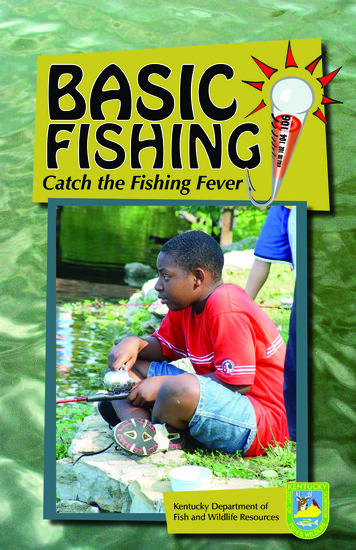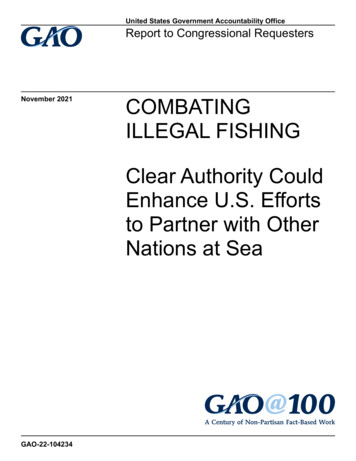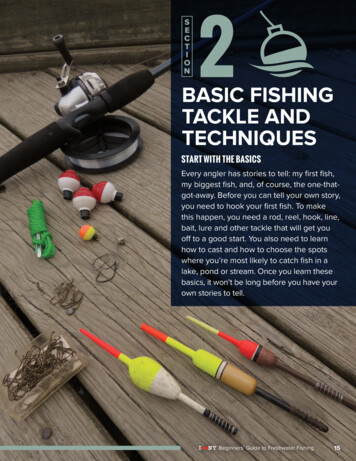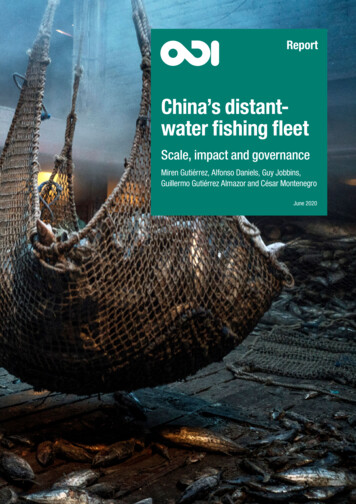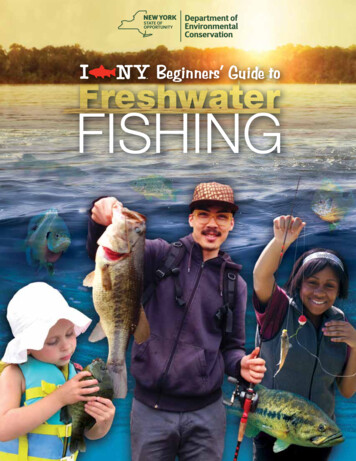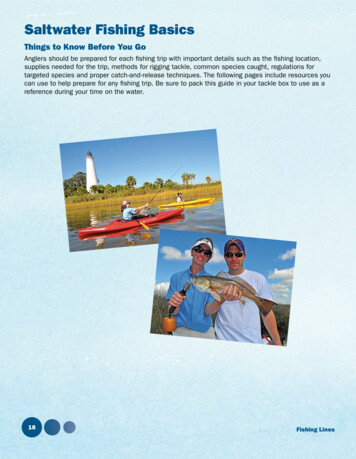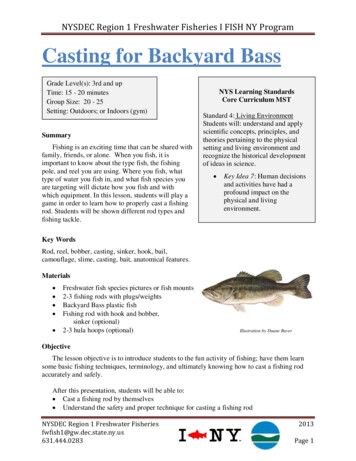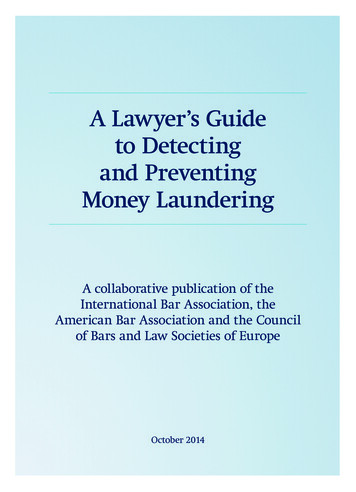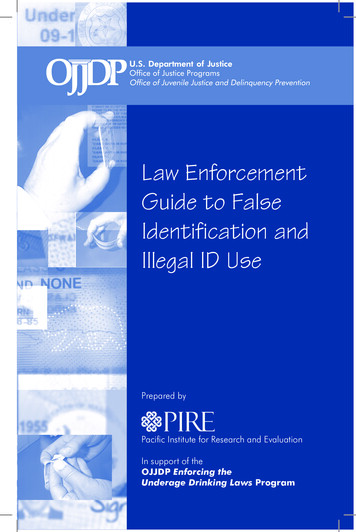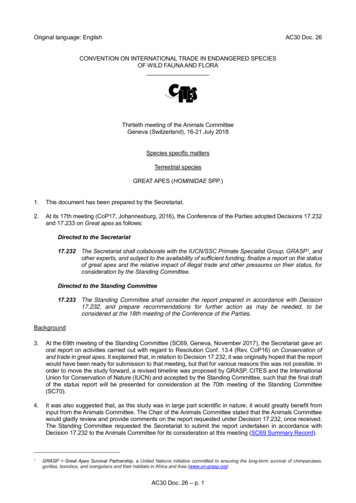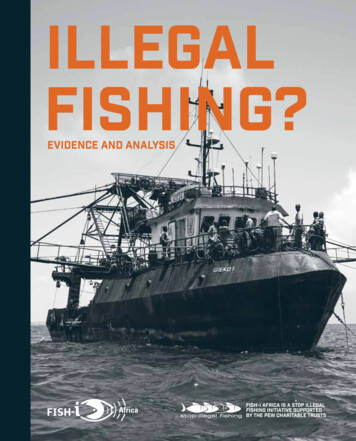
Transcription
ILLEGALFISHING?EVIDENCE AND ANALYSISFISH-i Africa is a Stop IllegalFishing initiative supportedby The Pew Charitable Trusts
FISH-i Africa unites eight East African coastal countries along the WesternIndian Ocean, an alliance which is showing that regional cooperation,coupled with dedicated analysis and technical expertise can stop illegalcatch getting to market, and prevent illegal operators pursuing theirlucrative business unhindered.FISH-i Africa is a Stop Illegal Fishing initiative supported by The PewCharitable Trusts and a Coordination Team made up of Stop Illegal Fishing,NFDS and TMT.This publication should be cited as Stop Illegal Fishing (2017)Illegal Fishing? Evidence and Analysis. Gaborone, Botswana.This report was prepared with available data for informational purposes. While Stop Illegal Fishing has madeefforts to confirm such data, it is otherwise provided “As-Is” without representation or warranty of any kind. StopIllegal Fishing disclaims any implied or statutory warranties, including without limitation any implied or statutorywarranty of merchantability, fitness for a particular purpose or infringement. Stop Illegal Fishing shall not haveany liability for any decisions made on the basis of the report or the data therein.All images copyright Stop Illegal Fishing, unless otherwise indicated. The images in this publication appear forthe purposes of illustrating fishing and related operations only and are not intended to convey or imply, directlyor indirectly, that any illegal fishing activities had taken place or were otherwise associated with the image.
00contents01 Acronyms 202 Foreword 303 Introduction 404 Evidence: What is happening? 5Illegal fishing 6Fisheries related illegality 9Fisheries associated crime 16Lawlessness 2105 Analysis: Why is this happening? 2406 Analysis: Where is this happening? 2607 Analysis: How is this happening? 28Vessel identity issues 29Flagging issues 32Document forgery 36Business practices 38Avoidance of penalties 4208 Analysis: How do they get away with it? 4409 Analysis: What needs to change? 485010 Conclusion 11Overview 5212 Afterword 54Fish-i africa 1
CSNFDSNDEARFMOSIFTMTUNCLOSUSAUSDVMSWIOAutomatic identification systemConvention for the Conservation of Antarctic Marine Living ResourcesExclusive economic zoneEuropean UnionEuroFisheries Committee for the West Central Gulf of GuineaInternational Commission for the Conservation of Atlantic TunasInternational Maritime OrganizationIndian Ocean CommissionIndian Ocean Tuna CommissionIllegal, unreported and unregulated fishingMonitoring, control and surveillanceNordenfjeldske Development ServicesNational Drugs Enforcement Agency, SeychellesRegional fisheries management organisationStop Illegal FishingTrygg Mat TrackingUnited Nations Convention on the Law of the SeaUnited States of AmericaUnited States dollarVessel monitoring systemWestern Indian OceanFish-i africa 2
02ForewordElsa da Gloria PátriaStop Illegal Fishing was established in 2007, and for the last decade has been at theforefront of efforts to end illegal fishing, with a special focus on the coastal watersof Africa. The Western Indian Ocean (WIO) is home to some of the most abundantfish stocks in the world, however the limited capacity to patrol and monitorthese fisheries has resulted in an illegal fishing hot spot where fishing violations,illegalities and crimes have gone unnoticed and largely unchecked for many years.In response to this challenge FISH-i Africa was formed in 2012, a regional TaskForce of coastal States who share a common problem and who hoped to find acommon solution by working together. Task Force members share informationon licensed vessels, port inspections and vessel movements and cooperate oninvestigations – the results have been significant, with a range of illegalities quicklyuncovered and acted upon. Results have included; arrests, settlements, paymentsof fines, a fraudulent licensing operation being closed-down and an increase inlicence revenue.The success experienced by FISH-i Africa is examined in our 2016 publicationFISH-i Africa: Issues, Investigations, Impacts which demonstrates the real valuethat FISH-i has offered; by providing a common platform, shared informationand expert support. This value is now being recognised around the world, and themodel is being adapted and adopted to fit the needs of other regional coastal Stateclusters, including the West Africa Task Force, hosted by the Fisheries Committeefor the West Central Gulf of Guinea (FCWC) as well as within regional fisheriesmanagement organisations (RFMOs).In this new publication, Illegal Fishing? Evidence and Analysis, the work of FISH-iis examined in a different way. We take a closer look at some of the investigationsthat the Task Force has collaborated on and at the wider experiences of crime andillegality in the WIO, to better understand the scale and scope of the issues and toensure that we are responding in the most effective manner. By breaking down themethods and techniques being employed to undertake and get away with illegalfishing and fisheries related illegalities, we have been able to highlight the areaswhere change is needed.It is heartening to see that many of the principles and ambitions, such asinformation sharing and regional cooperation, already enshrined in the FISH-iphilosophy, are what is needed to support ongoing efforts to stop illegal fishingin the WIO. The cooperation and support of the Indian Ocean Tuna Commission(IOTC), the Indian Ocean Commission (IOC) and The Pew Charitable Trusts hasbeen vital to FISH-i and we look forward to working ever more closely with theseand new partners both in the region and internationally.We hope this publication will contribute to the increased understandingof, and support to, the actions needed to stop illegal fishing.Elsa da Gloria PátriaChairperson of Stop Illegal FishingFish-i africa 3
03IntroductionIn late 2012, the FISH-i Africa Task Force started working to enable authorities toidentify and act against large-scale illegal, unreported and unregulated (IUU) fishingin the WIO. FISH-i is a partnership between the eight East African coastal countriesof Comoros, Kenya, Madagascar, Mauritius, Mozambique, Seychelles, Somalia andthe United Republic of Tanzania supported by a Technical Team of experts. Thisalliance is showing that regional cooperation and information sharing, coupled withdedicated analysis and technical expertise can stop illegal catch getting to market,and prevent illegal operators pursuing their lucrative business unhindered.Through working together on over thirty investigations, FISH-i has shed lighton the scale and complexity of illegal activities in the fisheries sector of the WIOand highlighted the challenges that coastal State enforcement officers face toact against the perpetrators. The illegal acts produce increased profit for thoseresponsible, but for the WIO, they undermine the sustainability of the fisheriessector and reduce the nutritional, social and economic benefits resulting fromthe region’s blue economy.The benefits and results of the FISH-i Task Force are detailed in our 2016report FISH-i Africa: Issues, Investigations, Impacts. Here you can see detailsof the initial investigations examined to identify how and where FISH-i was ableto make a difference to investigations and enforcement actions.This publication, Illegal Fishing? Evidence and Analysis contains theevidence of what FISH-i has seen, uncovered and suspected over the past fouryears. Chapters 05 to 09 contain an analysis of why, where and how this ishappening, and ends by asking ‘what needs to change’ to stop this happeningin the future.Twenty investigations from the WIO are included as evidence, fifteen ofthese are FISH-i cases (Nos. 1 to 15) and five cases are not (Nos. 16 to 20). TheFISH-i cases have all been investigated with the involvement of the FISH-i TaskForce and Technical Team and involve actions taken by FISH-i coastal States.These cases are presented in more detail on ons. The last five cases are included to provide examplesof illegality that has been suspected in the FISH-i investigations but not proven,they demonstrate the involvement of arms, drugs and wildlife smuggling,human trafficking and escalating violence in the fisheries sector.Fish-i africa 4
04Evidence:what is happening?1FISH-i Africa’s first success: the PREMIER2Fake licensing operation uncovered3IUU listed vessels de-flagged4The multiple identities of the NAHAM-45Fugitives from justice6Mysterious operations on the Somali coast7Piracy, poaching and people smuggling?8Three vessels or one?9A repeat offender brought to book: the NESSA 710Mauritian action on Sri Lankan vessels11Rogues or ghosts?12Avoidance of penalties: the TXORI ARGI13Dual identity vessel on the run14Serial offenders in Somalia15Murder at sea?16Delinquency on the high seas17Armed guard denies inspection18Drug seizure in Seychellois waters19Arms seized off the Horn of Africa20Ivory concealed among anchovies in ZanzibarFish-i africa DocumentforgeryAvoidanceof No evidenceLawlessnessTwenty investigations are each summarised in the following sections, theycontain a short introduction to the case, an explanation of the methods used, theenforcement action and sanctions applied and the status of the case in early 2017.In the table below and the following section the cases are sorted into four groupsof activity to best describe them:5
Illegal fishingIllegal fishing activities occur when the legal framework related to fishing ora fishery is violated, including, for example, the law, regulations and licenceconditions. This can apply to fisheries that are under the jurisdiction of a coastalState or to high seas fisheries regulated by RFMOs. Offences commonly include:fishing without authorisation (i.e. fishing licence); fishing out of season or in closedareas; harvesting prohibited species; using banned fishing gear; and, catchingmore than the set quota.Of the 20 cases examined in this publication, 13 include illegal fishingactivities. Three of these are presented below, each demonstrating poaching inthe exclusive economic zone (EEZ) of Mauritius, Mozambique or Somalia. One casehas been settled (No. 12), with a fine paid after pressure was exerted by the coastalState – this case is now closed. Two cases are still open with no sanctions issued(Nos. 10 and 14). It has been difficult to conclude these cases due to challengesin identifying the vessels as well as limited cooperation with the flag States ofChina and Sri Lanka.The relatively small number of cases in this illegal fishing category, that do notinclude significant other violations or complications, is telling of the situation in thelarge-scale fishery of the WIO, where most of the cases under the consideration ofFISH-i have included more illegalities than just illegal fishing.Investigation no. 10Mauritian action on Sri Lankan vesselsThis case provides a textbook example of how information sharing and timely monitoring,control and surveillance (MCS) operations can be effective in stopping illegal fishing.Based on their automatic identification system (AIS) signals, four Sri Lankan longline vessels:YASAISURU-3, YASAISURU–3 (C), YASAISURU-3 -B 7.4V and YASAISURU-3 -A 6.2V appearedto fish in Mauritian waters. By cross checking this information with relevant fishing licence listsand RFMO authorised fishing vessel lists, it was confirmed that if fishing, they were poaching.Prompt action by the coastal State established the presence of the vessels through aerialsurveillance, and two of the vessels were confirmed to be fishing illegally.What?HOW?Fish-i africa Vessel identity (suspected) – these vessels all had very similar names.As most Sri Lankan vessels appear to be authorised to IOTC usingregistration numbers rather than names, finding the true identity of thevessels in this case, and any information about them, was difficult.Avoidance of penalties (suspected) – none of the four vessels respondedto attempts by Mauritian authorities to contact them, suggestingthey deliberately attempted to avoid contact and any penalty forfishing illegally.6
Enforcementaction/sanctionsNone confirmedstatusOngoingInvestigation no. 12Avoidance of penalties: The TXORI ARGIThe Spanish flagged and owned purse seiner TXORI ARGI was fined for fishing without a licencein Mozambican waters and failing to report its catch. The vessel was detained whilst a settlementof USD 1.2 million was agreed and a bank guarantee was given. Upon release of the vessel,authorities in Mozambique were informed the fine would not be paid. Mozambique respondedby proposing to place the TXORI ARGI on the IUU fishing list of the IOTC. In addition, fishinglicences of other vessels owned by the same company were suspended by Mozambique. In theend, a settlement of USD 700 000 was agreed, the IUU listing of the vessel was dropped andthe suspension of the fishing licences was lifted.What?HOW?Avoidance of penalties – the original fine was not paid and it was onlyafter strong action by Mozambique that INPESCA, the owner, agreed topay a smaller amount.Enforcementaction/sanctionsAdministrative fine of USD 1.2 million was agreed but negotiationsreduced this to USD 700 000.statusClosedInvestigation no. 14Serial offenders in SomaliaWhile Somalia is rebuilding its capacity to control fishing activity in its EEZ, some vesseloperators repeatedly disregard the laws and regulations and take advantage of the fact thatSomalia still has limited capacity to police their waters. This case demonstrates how a group ofChinese longliners (including six using the name LU QING YUAN YU followed by the numbers 101,102, 105, 106, 107 and 108, and the XIN SHI JI 85) has repeatedly, over several years, been fishingillegally in Somalia. Somalia raised this issue with the flag State China, but to date the vesselsare still operating without sanction.What?HOW?Vessel identity – one of the vessels’ identity was unknown, its AIS is notlinked to any identity information.Flagging (suspected) – the vessels were all flagged to China, but despitecommunication via the IOTC, no action seems to have been takenby China.Enforcementaction/sanctionsNone knownstatusOngoingFish-i africa 7
Fish-i africa 8
Fisheries related illegalityFisheries related illegality goes beyond non-compliance to fisheries laws andregulations to include related offences. Evidence shows that even though the actualfishing activity may be compliant, activities such as forgery of documents or misuseof vessel identity render the fishing unlawful, as access to the fishery was madeunder false pretences.These illegalities are often systematic, such as avoidance of import andexport taxes, white washing of illegal fish into the legitimate value chain, fraud andcorruption. These related crimes conducted within the fisheries sector, are oftentransnational and organised.Of the 20 cases included in this publication, 11 include fisheries related illegality.Eight of these are summarised below, providing compelling evidence, or suspicion,of: document forgery (all eight cases); illegal business practices (seven cases);fraudulent or incorrect vessel identities (six cases); fraudulent or incorrect vesselflagging (six cases); and avoidance of penalties or vessels absconding (five cases).One case has been settled and closed (No. 1), with a fine paid after pressure wasexerted by the FISH-i coastal States and negative publicity for the owners ensued.Of the other seven cases, three vessels are detained (Nos. 3, 4 and 5), a fine hasbeen paid (No. 11), but all seven cases remain open.The high number of cases that include fisheries related illegalities across thevalue chain indicate a serious, illegal, transnational and organised element to thefisheries of the WIO that undermines sustainability of the fishery resources andgovernance within the region.Investigation no. 1FISH-i Africa’s first success: the PREMIERThe PREMIER was a high-profile case with significant results, including the payment of a sizeablefine to Liberia by the owner, and the spurring of action by the flag State, South Korea to amendtheir laws. The PREMIER, a purse seine vessel was caught fishing illegally in West Africa andthen attempted to relocate to the WIO. The network of the newly formed FISH-i Task Force wasalready on the alert, and the FISH-i countries worked together as a region to stop the PREMIERcontinuing its fishing activities and refusing any fish from the vessel to enter the marketthrough their ports.What?HOW?Fish-i africa Avoidance of penalties – Dongwon, owners of the PREMIER, only paidthe fine to Liberia after negative publicity internationally, denial of portservices and reduced market prices due to consumer concerns, left themwith no choice.9
Document forgery – a forged Liberian fishing licence was used to coverup illegal fishing in Liberian waters. When the PREMIER was applyingfor fishing licences, the letters presented to authorities in Kenya andMozambique, allegedly from Liberian authorities absolving the vesselof any illegal activities, were also identified as forgeries.Business Practices (suspected) – Dongwon used agents in Liberia andthe WIO that have been implicated in various cases of illegal fishing andfraud. This provides suspicion that the choice of agent may have beenintentional to utilise their networks. Dongwon claimed they obtained theforged fishing licence in Liberia via their agent from a government official.If this is correct, then the use of corruption can be suspected.Enforcementaction/sanctionsUSD one millionstatusCase closed. The PREMIER was renamed the ADRIA and is still operatingin the WIO.Investigation no. 2Fake licensing operation uncoveredAt a time when the threat of piracy was considered the reason for low numbers of longline fishingvessels obtaining licences to fish in Tanzanian waters, a large organised network distributingfake documents through corrupt practises was exposed. As a direct result of this exposure, manyvessels that had been fishing in Tanzanian waters with fraudulent fishing licences were forcedto obtain legal fishing licences from the Tanzanian authorities, increasing government revenueand improving control over the country’s fisheries. Improved licensing procedures have sincebeen introduced and a Multi-Agency Task Team has been established to deal with organisedenvironmental crimes in Tanzania.What?HOW?Business practices – the vessels’ Taiwanese owners had used anagent that bought licences from a Tanzanian fishery official, butwho transferred the payments to a private bank account (indicatingcorruption). Investigations to identify the beneficial owner examinedcompany structures in Taiwan, where each vessel was ‘owned’ bya separate company, essentially making it very difficult to track thebeneficial owner.Document forgery – although it is possible that more existed,11 fraudulently issued fake Tanzanian licences were identified.Enforcementaction/sanctionsA junior staff member was initially arrested for forgery of licencedocuments but later released.An arrest warrant was issued against the vessels’ agent, but no arresthas yet been made.statusOngoingFish-i africa 10
Investigation no. 3IUU listed vessels de-flaggedName and flag changes are common ways in which IUU fishing vessels’ owners avoid theconsequences of being IUU listed by RFMOs. Two IUU listed toothfish longliners, using the namesALDABRA and CHANG BAI, were de-flagged by Tanzania at the request of the RFMO Commissionfor the Conservation of Antarctic Marine Living Resources (CCAMLR). The ALDABRA is nowoperating as a stateless vessel and, after many name changes, the CHANG BAI is currentlydetained thanks to international cooperation and investigation.What?HOW?Vessel identity – both the ALDABRA and CHANG BAI changed identitymultiple times to hide their history of IUU fishing across jurisdictions,enabling the vessels to register with new flag States, such as Tanzania,and obtain authorisations to fish.Flagging – flag hopping helps conceal the identity of IUU fishing vessels.The use of flags of convenience and non-compliance keeps checks andcontrols to a minimum and if caught operating illegally there is littlefollow up from flag States who may not have the will nor capacity to act.Business practices – the company structures for both vessels were foundto span over several continents, making identification of the beneficialowner difficult. There was suspicion that corruption may have limitedthe sharing of information between agencies in Tanzania and later, theundetected absconding from Thai detention of the CHANG BAI undera new name KUNLUN, provides further suspicion of corruption.Avoidance of penalties – not only did the KUNLUN abscond but byhiding the identity and history of the vessels, the owner avoided theconsequences of being IUU listed by an RFMO.Document forgery (suspected) – the registration documents providedto Tanzania are suspected to be forgeries.Enforcementaction/sanctionsCHANG BAI renamed as KUNLUN, and then ASIAN WARRIOR, is subjectto an INTERPOL Purple Notice and is currently detained in Senegal.statusOngoing: the ALDABRA is currently thought to be stateless and is stilloperating, location not known.Investigation no. 4The multiple identities of the NAHAM-4The NAHAM-4 investigation highlights the extent of vessel identity fraud occurring in the fishingindustry. The vessel, a Taiwanese-owned tuna longliner, was detained and later confiscated bySouth African authorities due to uncertainty about its identity. Meanwhile at least four othervessels were identified as having operated with the name NAHAM-4.HOW?What?Fish-i africa Vessel identity – with no mandatory identification system, fisheriesinspectors rely on vessel names, which can be easily painted over to fitwith available licences or to hide a history of non-compliance, as was thecase with the NAHAM-4 name.Business practices – a complex network of company ownership raisedchallenges with the accurate identification of the beneficial owner.Threats were made to a journalist that was delving into the Omaniregistration and business aspects of Al-Naham Co LLC., raising suspicionsthat corrupt practices were taking place in Oman.11
Document forgery – four different vessels operated as theNAHAM-4, providing evidence that at least three of these werefraudulently using the name. Documents were also identified asforgeries by South African authorities.Flagging (suspected) – the owners of NAHAM-4 do not appear tohave any connection to Oman, the flag State, hence there is suspicionthat flagging to Oman was intentional to benefit from Oman’s limitedapplication of its flag State responsibilities.Enforcementaction/sanctionsSouth African authorities seized both the vessel and the fish on board.The owner and its representatives were charged and convicted on sevencounts related to South Africa’s and the IOTC’s legislation.statusOngoing investigations to locate the remaining NAHAM-4vessels continue.Investigation no. 5Fugitives from justiceThe SAMUDERA PASIFIC No. 8 and BERKAT MENJALA No. 23 were part of a fleet of10 Indonesian-flagged longliners arrested off the coast of South Africa for suspected illegalfishing activities. The case and the associated media focused public attention in Africa on theplight of crew on illegal fishing vessels. Whilst under detention in Cape Town, two of the vesselsabsconded and are still at large; both are subject to INTERPOL Purple Notices. This investigationdemonstrates the wide range of business and other methods used by illegal owners andoperators to enable them to fish and operate illegally.What?HOW?Vessel identity – crew testimony reports that re-naming vessels bypainting new names over old is routine practice and allows vesselsto evade detection by authorities. The true identity of the vessels isstill unknown.Flagging – the Indonesia registration documents were reported to befake, so it is likely that the vessels were stateless at the time of theirarrest. After absconding, they registered in the Mombasa port log witha Tanzanian call sign.Business practices – there is evidence that the ownership of the twovessels that escaped was changed while they were under arrest in CapeTown to a company registered in Zanzibar. It was also reported, that thecrew had been tricked into working on these vessels, their wages had notbeen paid, and living and working conditions were substandard, unsafeand unhygienic. In addition, it is suspected that the vessels may havebeen de-commissioned by Indonesia before assuming false identitiesand engaging in fishing activity in the WIO. There are also suspicions thatcorrupt officials may have facilitated the escape of the two vessels fromCape Town, but no charges have been made.Avoidance of penalties – the detained vessels absconded and haveassumed new identities, thereby avoiding penalties for operating illegally.Document forgery – the vessels were using false Indonesian registrationdocuments, and fraudulently sharing several fishing licences.Enforcementaction/sanctionsConfiscated by South Africa, but two vessels escaped from arrest.statusOngoing efforts to identify the vessels involved continue.Fish-i africa 12
Investigation no. 8Three vessels or one?This case highlights the complex use and abuse of vessel identities and how these wereuncovered. FISH-i compared tracks of longliners and photographs taken during port visits aroundthe WIO to expose the ambiguity in the vessels’ identities. Later, media sources in Indonesia castfurther uncertainty on the identities of the vessels. The importance of cross checking informationand the value of taking and sharing photographs of fishing vessels is highlighted, without whichthe misuse of identities would have been difficult to confirm.What?HOW?Vessel identity – at least five vessels were evidently using the identitiesof two fishing vessels. A vessel transmitting on AIS as CHI HSIANG NO.7 was physically painted with the name BINTANG SAMUDRA-68, whilesome months later, a vessel transmitting on AIS as CHI HSIANG NO. 7 wasphysically painted with the name KARYA WIJAYA 201. Photographic analysisof the two vessels demonstrated that they were likely to be the same vessel.Business practices – in trying to identify the owners, links to a bankruptIndonesian company were uncovered, but the current vessel ownerscould not be identified.Document forgery (suspected) – documents were presented toMauritius in the name of KARYA WIJAYA-201, however it is not clear ifthese were forgeries, or simply copies of documents from the true KARYAWIJAYA-201. Forged documents are also likely to have been requiredto support the other name changes.Flagging (suspected) – Indonesian and Taiwanese flags were used by thevessels, but due to the identity issues it is suspected that these may havebeen false Investigation no. 11Rogues or ghosts?The Belize-registered trawler GREKO 1 was known to be active in Somali waters for several years,but it was not until 2016 when a European Union (EU) navy patrol started to provide Somalia withsightings of fishing vessels in their EEZ that this vessel’s operations were analysed. A port inspectionof the vessel in Mogadishu established that illegal fishing had taken place throughout 2016, and aUSD 65 000 fine was paid. Investigations into the GREKO 1 and her sister ship the GREKO 2 revealedthat both vessels were listed as ‘scrapped’, and for this the owners had received EUR 1.4 millionunder an EU capacity reduction scheme. Ongoing investigations are yet to verify the true identity ofthe ‘scrapped’ vessels and the identity of the GREKO 1 that was fishing illegally in Somalia.What?HOW?Fish-i africa Vessel identity – the complex identity history of both the GREKO 1and GREKO 2 made it difficult to confirm whether these names hadbeen transferred (reused) between vessels, or whether changes hadbeen made to vessel histories in a deliberate effort to hide a potentialscrapping fraud. Inconsistent use of Greek and Roman letters in officialdocuments made tracing the vessel history difficult.13
Flagging – change of flag from Greece to Somalia and then to Belizeduring the months when the GREKO 1 and GREKO 2 were allegedlyscrapped may have been designed to cover up the true history andidentity of the vessels.Avoidance of penalties – the GREKO 1 absconded from Somaliauthorities and only settled the fine after Kenyan authorities intervened.Document forgery – a forged licence to fish in the Puntland zone ofSomalia was provided to Kenyan authorities.Business practices (suspected) – if the vessel scrapping is found to havebeen fraudulent, some level of corruption is suspected in relation to thecompensation payment.Enforcementaction/sanctionsUSD 65 000statusOngoingInvestigation no. 13Dual identity vessel on the runRoutine AIS monitoring of FISH-i countries’ EEZs in 2014 identified a fishing vessel thatappeared to be hiding its identity to fish without a licence. Under detention in Seychelles in2015, investigations indicated that the longliner, JIN SHYANG YIH 668 had engaged extensivelyin unauthorised fishing in the WIO and had probably also transhipped its catch illegally whilstat sea. Now on the run from flag State Thailand, the current location and identity of thevessel is unknown.What?HOW?Vessel identity – the JIN SHYANG YIH-666 was transmitting vesselmonitoring system (VMS) under the name BINTANG SAMUDRA-09,possibly to appear that it was a licenced fishing vessel and/or to coverup the illegal fishing past of the JIN SHYANG YIH-666. Following theuncovering of the inconsistency between the VMS and AIS signals, theowners renamed the vessel to JIN S
the United Republic of Tanzania supported by a Technical Team of experts. This alliance is showing that regional cooperation and information sharing, coupled with dedicated analysis and technical expertise can stop illegal catch getting to market, and prevent illegal operators pursuing their lucrative business unhindered.
